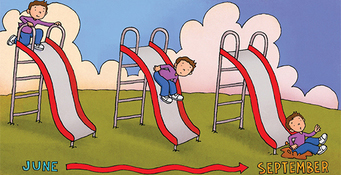Julia, Week 15 - Memories of an Aspiring Author
I thought I was going to be an author when I was younger. I had no idea where I felt this sudden spark of ambition, but six-year-old me kept cranking out stapled little booklets left and right. Writing these little stories helped distract me from the fact that I really had no true friends to have playdates with, my only “close” friend being a person that would always boss me around. The genres of these books would range from stories based on real events that would implement morals (since my life at the time consisted of many wild adventures with my family,) to a never-ending series of facts of an animal or certain color that I particularly enjoyed. My most vivid memory involving this early passion for creating literature comes from a late spring afternoon in my first-grade classroom. Our only assignment that day was to be able to teach the entire class to do an activity that we genuinely enjoyed. Of course, with the only active hobby ...











